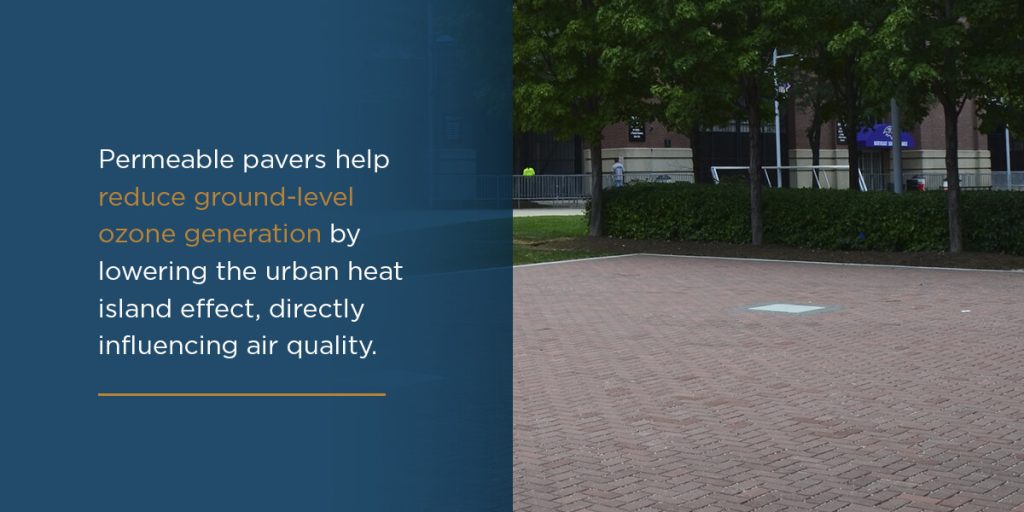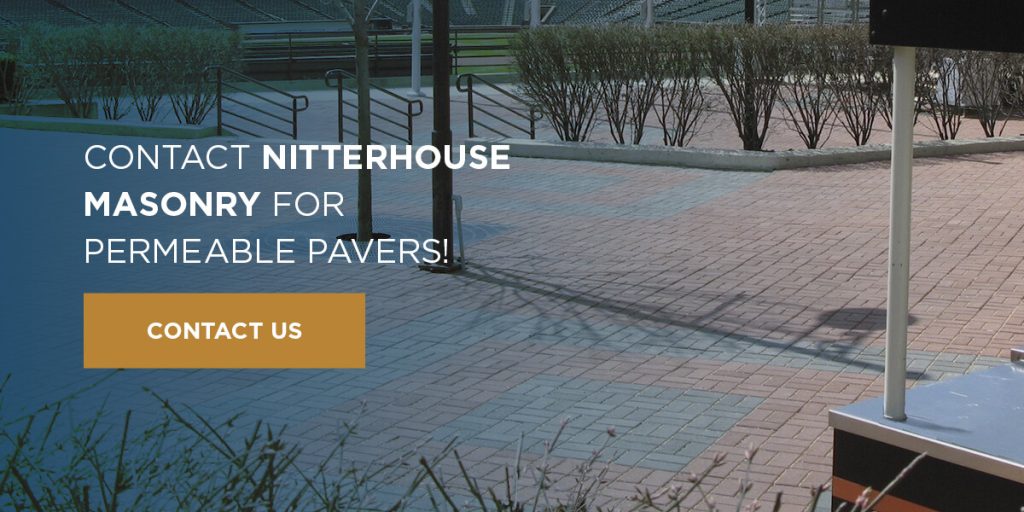
Commercial and residential applications in areas prone to heavy rainstorms, floods or snowfall can install a specific type of environmentally friendly and cost-effective pavement — permeable pavers.
But what are the environmental benefits of permeable pavers? What difference do they have in comparison to traditional pavement options? If they are environmental pavers, how do they work?
How Do Permeable Pavers Work?
Permeable pavements are a type of stormwater control that allows water and snow melt to make it through the gaps and into the ground below. These surfaces help evaporate, detain or filter stormwater and snow melt on-site.
Permeable pavement surfaces consist of either a porous substance that allows stormwater to flow through it or nonporous blocks spaced apart enough to allow water to flow through the gaps. There are various types of permeable pavements, like porous asphalt, pervious concrete and permeable interlocking concrete pavement (PICP).
The reduced amount of sand makes porous asphalt and pervious concrete different from traditional asphalt or concrete, resulting in greater porosity and infiltration. PICP, on the other hand, is made up of prefabricated concrete units with small gaps between permeable joints filled with small, absorbent aggregates.
The absorbent aggregate layer and base can help detain water when absorbed by the porous surface layer, making it a green infrastructure alternative to traditional impervious surfaces. Permeable pavers can be incredibly cost-effective and beneficial in areas with high land values and where floods or ice is a significant issue.
What Are The Environmental Benefits of Permeable Pavers?
So, what exactly do these environmental pavers have to offer? There is more than meets the eye with these permeable pavers’ environmental benefits.
1. Reduces Stormwater Runoff
Permeable pavers help reduce the volume of stormwater runoff by catching and slowly draining the water into the soil rather than having it form puddles and flow into drains and receiving waterways as waste. Permeable pavement may minimize water treatment expenses, floods and erosion by lowering runoff volumes and rates.
2. Reduces Pollutants
Natural filtration occurs when rainwater is returned to the earth when it passes through the sub-base of the pavement. This process may eliminate pollutants from the water in a few different ways:
- Physically: Trapped in the pavement or down in the soil
- Chemically: Broken down by toxin-consuming bacteria and microorganisms
3. Reduces Urban Heat Islands
In towns and cities, surfaces mainly consist of concrete or asphalt pavement, which absorbs heat, raising the temperature in those areas and resulting in the urban heat island effect. We could eliminate heat islands and lower temperatures if we placed more permeable pavement that allows the earth beneath to breathe.
4. Increases Energy Efficiency
Permeable pavers absorb less heat than traditional pavement, which helps lower the surrounding air temperature, resulting in less demand for building cooling systems.
5. Benefits Air Quality

Because permeable pavers collect rainwater on-site, communities may minimize the amount of water treatment required, lowering air pollution and CO2 emissions from power plants. Permeable pavers help reduce ground-level ozone generation by lowering the urban heat island effect, directly influencing air quality.
6. Reduces Salt Usage
Permeable pavement significantly delays the formation of a frost layer in colder climates — reducing the requirement for salt. Communities can save money and prevent pollution in local rivers and groundwater sources by lowering their reliance on salt.
7. Reduces Water Demand
It takes a lot of water to keep a lawn green, but extreme weather, poor soil conditions and a lack of water due to drought can make it challenging to achieve this look. Permeable pavers will give your outdoor area a new look while reducing water demand. The water can flow directly into garden beds, tree plantations and entire ecosystems through porous surfaces. The filtered water provided by pervious and porous surfaces is also ideal for organic material replenishment.
8. Prevents Erosion
If you experience arid summers, permeable pavers can help reduce erosion when it does rain. Permeable pavers, whether used to build a patio, walkway or driveway, can help reduce erosion because their design allows water to seep back into the ground. This design feature reduces runoff by encouraging the natural water cycle.
More Benefits of Permeable Pavers
Of course, there are other benefits to installing permeable pavers. They may not necessarily be environmental benefits, but they add an advantage to residential and commercial areas.
High Durability
Many pavers are robust enough to support a fire vehicle without breaking or cracking. Many professionals even propose them as a Low Impact Development solution for parking lots. Because permeable pavers are floating surfaces with joints, they remain flexible when the soil beneath compresses or washes away or frost causes upheaval. Permeable pavers, unlike concrete, will not crack from the expansion and contraction of the layers.
Easy Installation
Unlike asphalt or concrete surfaces, permeable pavers don’t require expensive specialized equipment. The installation process for permeable pavers starts with a clear and level area with a layer of rock. Then, you’d install and secure pallet-sized grids to the pavers — almost like laying down pieces of a pavement puzzle. Gravel or limestone will then fill the gaps — all compacted to form a robust and lasting surface.
Low Cost
Asphalt and concrete may be costly to install and require significant effort. Permeable pavement is often less expensive per square foot and requires far less labor.
Easy Repairs
Unlike traditional concrete pavers, permeable interlocking concrete pavers don’t crack, thanks to the pores that allow for airspace and natural temperature changes. In other words, your pavement will not need repairs as frequently. Repairs are relatively simple — you can remove and replace a damaged stone instead of an entire section.
Overflow Parking Options
The easy installation process can make permeable pavers a perfect solution for:
- Parking lots for commercial areas that need additional parking for events or large gatherings
- Lawn parking for residential areas and homeowners
Aesthetics
Homeowners who love a natural and rustic aesthetic can install permeable pavers. Some homeowners want to space their paving stones further apart so grass may grow between them. This natural appearance may be achieved anywhere, including driveways, patios and sidewalks.
Fewer Mosquitoes
Installing permeable pavers reduces the amount of standing water and pools, which are optimal breeding grounds for mosquitoes and other insects. Because the water will drain through the porous surface, it will likely result in fewer pests in your area.

Contact Nitterhouse Masonry for Permeable Pavers!
Permeable pavers are a perfect environmentally friendly and low-cost alternative to traditional pavers for commercial and residential applications. At Nitterhouse Masonry Products, we’re experts in the field and offer five generations of knowledge and experience for contractors, landscapers and homeowners. Contact us today and browse our products for more information.


